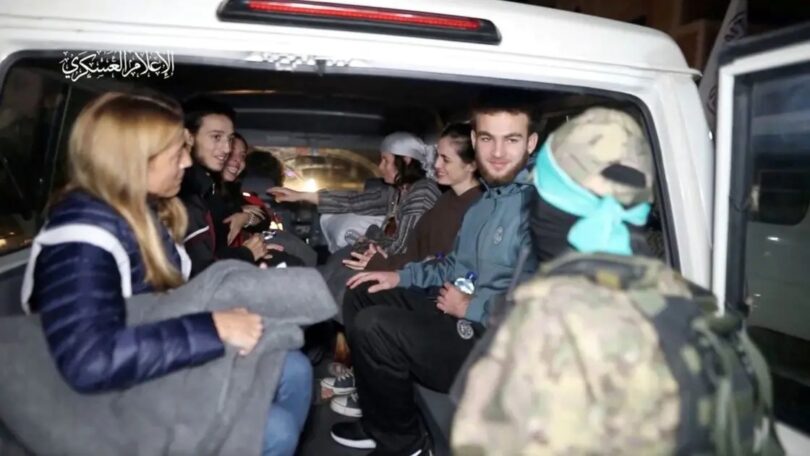GAZA (Agencies): Militant group Hamas released two more Israeli women hostages on Thursday with more Palestinian prisoners to be freed under an extended truce that has paused weeks of deadly conflict.
With the current truce set to expire early Friday, international bodies have called for a lasting halt to the violence, sparked by deadly Hamas attacks on Israel that prompted it to mount a devastating assault on the Gaza Strip.
The delicate truce held through its seventh day after a 24-hour extension despite a shooting claimed by Hamas militants that killed three people in Jerusalem.
US Secretary of State Anthony Blinken met with Israeli and Palestinian leaders to seek a longer pause that would allow further prisoner-hostage exchanges and more aid for displaced civilians in Gaza.
The Israeli military said on Thursday at least two women hostages had been returned from Gaza after being released to the Red Cross by Hamas.
More were expected to be transferred “in the next few hours,” it said. Israeli Prime Minister Benjamin Netanyahu’s office named the two as French-Israeli dual national Mia Shem, 21, and Amit Soussana, 40.
Israel is due to release more Palestinian prisoners in turn, after the sides agreed to extend the pause in combat operations until Friday morning.
Only hours after the truce extension, the militants claimed responsibility for a shooting in Jerusalem that killed three people and called for an “escalation of the resistance.”
The morning attack saw two gunmen from annexed east Jerusalem kill three people and wound eight others at a bus stop in the western part of the city, before two off-duty soldiers and civilians fired at them and “neutralized” them, police said.
Ten hostages per day
Separately, two Israeli soldiers were slightly injured in a ramming attack on a checkpoint in the occupied West Bank on Thursday, the army said, adding the assailant had also been “shot and neutralized.”
International bodies have called for more time to allow medical supplies, food and fuel into the besieged Gaza Strip after fierce combat and bombardments sparked by Hamas’ bloody October 7 attacks on Israel.
“We have seen over the last week the very positive development of hostages coming home, being reunited with their families,” Blinken said at a meeting with Israeli President Isaac Herzog in Tel Aviv.
“It’s also enabled an increase in humanitarian assistance to go to innocent civilians in Gaza who need it desperately. So this process is producing results. It’s important, and we hope that it can continue.”
Blinken later told Netanyahu it was “imperative” to protect civilians in southern Gaza “before any military operations there.”
The latest extended truce had been due to end at 0500 GMT Thursday, but the Israeli army said the “operational pause” would continue as international mediators negotiate the release of hostages held by Hamas.
Qatar, which has led the truce negotiations supported by Egypt and the United States, confirmed the pause had been extended for one day “under the same previous conditions.”
Fighting began on October 7 when Hamas militants broke through Gaza’s militarized border into Israel, killing 1,200 people, mostly civilians, and kidnapping about 240, according to Israeli authorities.
In response, Israel vowed to eliminate Hamas and unleashed an air and ground military campaign that the Hamas government says has killed more than 15,000 people in Gaza, also mostly civilians.
The truce agreement allows for extensions if Hamas can continue to release 10 hostages per day, but both sides have warned they are ready to return to fighting.
Since the truce began on November 24, 70 Israeli hostages have been freed in return for 210 Palestinian prisoners.
At least 24 foreigners, most of them Thais living in Israel, have been freed outside the terms of the deal.
Israel says it sees the truce as a temporary halt intended to free hostages, but there are growing calls for a more sustained pause in fighting.
The hostage releases have brought joy tinged with agony, with families anxiously waiting each night to learn if their loved ones will be freed, and learning harrowing details from those who return.
Four-year-old Abigail was captured after crawling out from under the body of her father, killed by militants, covered in his blood, her great aunt Liz Hirsh Naftali said.
Before the truce Israeli ground and air forces had pounded Gaza, forcing an estimated 1.7 million people — around 80 percent of the Hamas-run territory’s population — to leave their homes and limiting the entry of food, water, medicine and fuel.
‘Everything is gone’
Conditions in Gaza remain “catastrophic” and the population faces a “high risk of famine,” according to the World Food Program.
The truce has allowed some of the displaced to return to their homes, but for many there is little left.
“I discovered that my house had been completely destroyed — 27 years of my life to build it and everything is gone,” said Taghrid al-Najjar, 46, after returning to her home in southeastern Gaza.
The violence in Gaza has also raised tensions in the West Bank, where nearly 240 Palestinians have been killed by either Israeli soldiers or settlers since October 7, according to the Palestinian health ministry.
That figure exceeds the entire toll in the Israeli-Palestinian conflict for all of last year when 235 people died, mostly Palestinians, an AFP tally showed.
In a sign of mounting international tensions over the conflict, Israel’s Foreign Minister Eli Cohen said he was recalling the country’s envoy in Madrid over what he called “outrageous remarks” by Spanish Prime Minister Pedro Sanchez.
Sanchez had said in a television interview he had “serious doubts” over the legality of Israel’s actions in Gaza.
Courtesy: alarabiya







